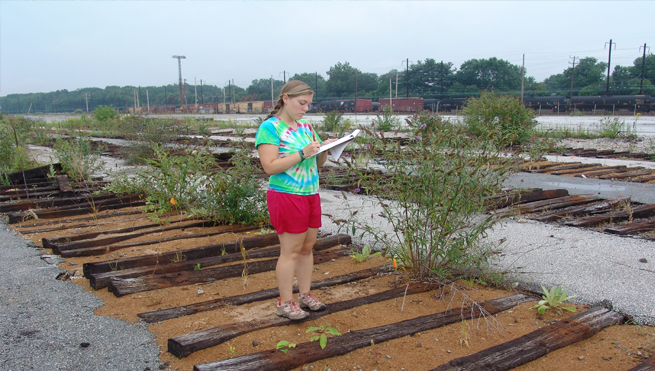by Katie Galgano
With the stress of spring semester and final exams behind them, most students at the University of Delaware packed their things to return home for a relaxing summer, but for the participants in the Summer Scholars Program, their academic pursuits were only just beginning. As their peers made their way to the beaches, the Summer Scholars made their way into labs, classrooms, and the field to conduct original research alongside distinguished faculty in their various departments. Though the program is open to students across campus, its rigor makes it particularly attractive to Honors students like Kevin Chang, a junior biomedical engineering and computer science student. He calls it “an experience that you can’t replicate anywhere else.” Kelly Burke, a junior music education major with minors in disability studies and math, expressed some initial reservations about participating in the program: “I was really hesitant, because it meant that I wouldn’t be able to go home for the summer, but I’m so glad I did it.” Her research, under Professor of Music Suzanne Burton brought her into classrooms of infants and toddlers to analyze how music affects vocalization in those with speech and language disorders. “Working with the infants and toddlers was so much fun. Every class they’d find a new way to impress me with their progress,” she reminisces.
The insight that Kelly and the other scholars gained expanded far beyond the confines of their specific focus areas into the practice of conducting research as a whole. As Kevin Chang explains, his research on using jello-like hydrogels to control the growth of blood vessel cells under Professor of Materials Science and Deputy Dean of Engineering Kristi Kiick taught him “much more than just lab techniques; it also [taught him] how to ask the right questions so that [he] could find out what [he wanted] to know.”
Kyle Tucker, a junior in chemical engineering and computer science conducted research with Chemical Engineering Professor and Interim Dean of Engineering Babatunde Ogunnaike. Kyle, who focused on improving wind turbine efficiency by predicting future wind speeds, learned that “things hardly ever work out the first time,” and that you should “be prepared to fail before you succeed.”
Neuroscience and psychology student Erin McKenna reflects Kyle’s sentiments as she recalls a particular day when she was left with no option but to turn away all her subjects. In the midst of an intense July heat wave, Erin was slated to gather data for her studies on emotion-induced blindness only to discover that the air conditioning in Wolf Hall was not working. “We had to send subjects home because sweat interferes with the signal picked up by the electrode cap,” she describes. “Essentially, we had to send people home because they would’ve been too sweaty in our lab and our equipment wouldn’t have worked properly as a result.” For Erin, working with Psychology Professor James Hoffman, the Summer Scholars Program taught her not only how to roll with the punches, but the importance of anticipating as many of those punches as possible when designing experiments. “I was surprised by how much thought and preparation goes into designing each experiment. With strict ethical standards and the cost of running an experiment, professors need to be sure that each experiment will draw some type of conclusion, whether supporting or not supporting the hypothesis.”
 The Summer Scholars Program offers a doorway into research that many of its participants eagerly pursue during the rest of their undergraduate careers and perhaps even beyond. While Kevin’s research over the summer focused primarily on the impact that the stiffness of the hydrogels had on cell viability, he will next explore the effects of other hydrogel properties on viability to ensure that the hydrogels can most effectively aid in blood vessel cell replacement. For junior ecology and biology student Samantha Nestory, her work on re-vegetating a disturbed industrial landscape with Professor Judith Hough-Goldestein in the Department of Entomology and Wildlife Ecology introduced her to restoration ecology, which she now is considering as a possible career path. Each of these students will also produce a senior thesis, earning them the Honors Degree with Distinction come graduation.
The Summer Scholars Program offers a doorway into research that many of its participants eagerly pursue during the rest of their undergraduate careers and perhaps even beyond. While Kevin’s research over the summer focused primarily on the impact that the stiffness of the hydrogels had on cell viability, he will next explore the effects of other hydrogel properties on viability to ensure that the hydrogels can most effectively aid in blood vessel cell replacement. For junior ecology and biology student Samantha Nestory, her work on re-vegetating a disturbed industrial landscape with Professor Judith Hough-Goldestein in the Department of Entomology and Wildlife Ecology introduced her to restoration ecology, which she now is considering as a possible career path. Each of these students will also produce a senior thesis, earning them the Honors Degree with Distinction come graduation.
As the Summer Scholars came together to present their finding at the research symposium on August 9, they were able to reflect on a truly remarkable journey of discovery. Perhaps one of the greatest strengths of the Summer Scholars Program, though, is not the field experience, but the bonding and close sense of community that forms when a group of highly motivated, intellectually curious students come together to work in close conjunction with leading experts in their departments. “I became close with the members of my lab and the department, so UD feels even more like a family for me,” Samantha explains.



